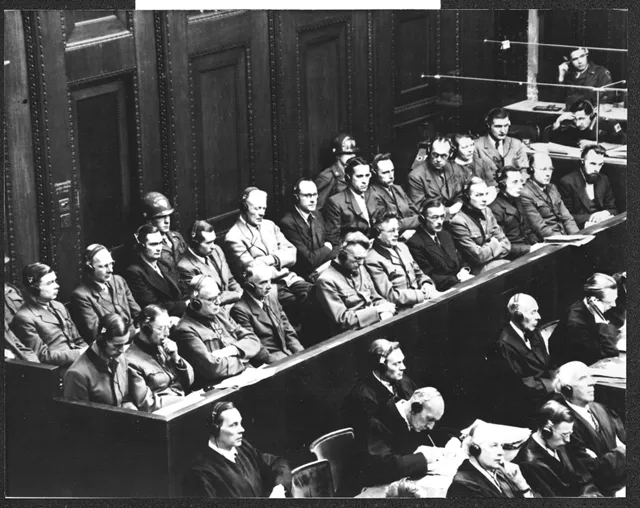Dogs of war
Is there all that much difference between 'We were just following orders,' and 'stuff happens'?

Audio By Carbonatix
[
{
"name": "GPT - Leaderboard - Inline - Content",
"component": "35519556",
"insertPoint": "5th",
"startingPoint": "3",
"requiredCountToDisplay": "3",
"maxInsertions": 100,
"adList": [
{
"adPreset": "LeaderboardInline"
}
]
}
]

Nuremberg: Its Lesson for Today
B
As cinema it's perfunctory. As history it's necessary.
Consigned to the archival dustbin upon completion, Stuart Schulberg's stoic, no-frills chronicle of the 11-month trial of former leaders of the Nazi regime stands out because of its startling film footage of war crimes, urban devastation, and concentration-camp atrocities (much of it captured by John Ford and the director's brother Bud, as part of their stint in the OSS).
Unfortunately, it also depicted the Soviet Union as a vital U.S. ally and aggrieved victim of Nazi crimes at a time when Josef Stalin's own genocidal policies were coming to light and America's Second Red Scare was just heating up. As a result the film was never seen in the United States, but, ironically, widely viewed in Germany.
Recently restored by Schulberg's daughter, Sandra, the 1948 documentary now includes new trial audio and updated narration by actor Liev Schreiber but still remains a bare-bones account of Germany's belligerent rise to power and the crimes against humanity that ensued.
It's pretty by-the-numbers stuff, dryly delivered and chronologically ordered, without flourish or cinematic creativity. The only punctuations are the ghastly shots of concentration camp victims and starving civilians. The truth is, Schulberg's film predates the idea of documentaries as anything other informative or didactic. The narration and images are about as subtle as a hammer, determined to make unambiguous indictments against the architects of the Third Reich.
Still, seeing Hermann Göring, Rudolf Hess, Albert Speer and others equivocate while announcing their newfound feelings of shame and guilt is to understand the long tradition of political leaders cravenly refusing to take responsibility for their actions.
This may ultimately be the film's unintended "lesson for today." After all, despite the Nuremberg trials, state-sanctioned torture and acts of genocide continue today — and often go unpunished or, worse, get excused by the international community. The United States, in particular, has proven to be especially cagey about upholding the morals and values espoused at those 1945 trials.
If the film succeeds in achieving any resonance today, it's by putting forth the notion that all nations and all leaders should be held accountable for their acts of aggression.
Because if history is indeed written by the victors, as Winston Churchill once said, one wonders what an Iraqi trial would have concluded of George W. Bush, Dick Cheney and Donald Rumsfeld — had history taken a different turn. Is there all that much difference between "We were just following orders," and "stuff happens"?
Nuremberg: Its Lesson for Today may not offer up any new lessons or revelations. But it should still be witnessed, learned, and contemplated. If only to ensure that we do not become the thing we once understood to be evil. - Jeff Meyers
Showing at the Detroit Film Theatre (inside the DIA, 5200 Woodward Ave., Detroit; 313-833-3237), at 4 p.m. Saturday, Aug. 6, and at 2 p.m. Sunday, Aug. 7. Sandra Schulberg, the producer-director of the restored Nuremberg, will introduce both showings and hold a Q&A with the audience following the film.





